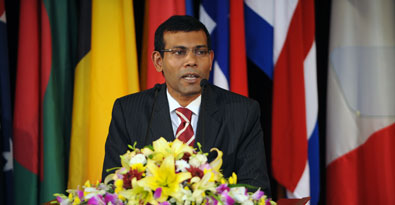18 July 2010: The Maldives hosted the second meeting of the ‘Cartagena Group/Dialogue for Progressive Action’ on 17-18 July 2010, at Bandos Island resort, near Male, as an informal space open to all countries committed to reaching an ambitious outcome through the UNFCCC negotiations, and to becoming or remaining low-carbon.
In a keynote speech, Maldives […]
 18 July 2010: The Maldives hosted the second meeting of the ‘Cartagena Group/Dialogue for Progressive Action’ on 17-18 July 2010, at Bandos Island resort, near Male, as an informal space open to all countries committed to reaching an ambitious outcome through the UNFCCC negotiations, and to becoming or remaining low-carbon.
18 July 2010: The Maldives hosted the second meeting of the ‘Cartagena Group/Dialogue for Progressive Action’ on 17-18 July 2010, at Bandos Island resort, near Male, as an informal space open to all countries committed to reaching an ambitious outcome through the UNFCCC negotiations, and to becoming or remaining low-carbon.
In a keynote speech, Maldives President Nasheed stressed that re-establishing confidence “must start in Cancun by reaching agreement across all core issues, especially the inter-related issues of mitigation, finance, and monitoring, reporting and verification (MRV).” Tewolde Egziabher, Director-General of Ethiopia’s Environmental Protection Authority, announced that Ethiopia aims to become carbon neutral by 2025, by switching from fossil fuels to renewable energy, in particular hydropower, and by implementing a vast reforestation scheme. Faumuina Tiatia, Samoan Minister of Natural Resources and Environment, announced Samoa’s plan to become carbon neutral by 2020. Phillip Muller, Marshall Island’s Ambassador to the UN, announced the Marshall Islands’ pledge to cut carbon dioxide emissions by 40% by 2020, against 2009 levels. The Prime Minister of Antigua and Barbuda, Baldwin Spencer, announced his country’s intention to cut emissions by one quarter by 2020, from 1990 levels. Andrei Bourrouet, Costa Rican Vice Minister of Environmental Management and Energy, expressed his country’s commitment to achieving carbon neutrality by 2021.
In the Chair’s statement of the meeting, the representatives of 27 parties to the UNFCCC participating in the meeting reaffirm their commitment to work together within the UNFCCC process in a positive, proactive and constructive manner to urgently secure an ambitious, comprehensive, fair, balanced and legally-binding agreement on climate change. They confirm that the Copenhagen Accord, while perhaps incomplete, represents an important step forward and offers political direction to guide the ongoing negotiations. They further welcome the fact that a large number of countries have pledged national efforts to mitigate climate change under the Accord and that donors have begun providing fast-start contributions, while recognizing that mitigation ambition needs to be significantly scaled-up.
Participants express their belief that encouraging and completing the transition to a low-emission society, including by providing support for low-emitting countries to continue to develop on a low-emission pathway, not only holds the key to stabilizing the global climate, but also to promoting sustainable development and high growth, eradicating poverty and building a fairer, more equitable society. They agree that, for developing countries to pursue low-carbon growth, significant, predictable and accessible financial support must be provided from developed country parties and the carbon markets.
Participants further express their belief that, beneath the polarized rhetoric in international climate change negotiations, the contours of a deal are discernible, and they have an important role to play in rebuilding trust and confidence, in staking-out the middle ground and inviting others to join. They also decided to meet, where useful, on the margins of UNFCCC inter-sessionals, and to hold a third meeting of the Cartagena Group/Dialogue for Progressive Action in Costa Rica, from 29-30 October 2010. They also welcomed the offers of the Governments of Samoa and Antigua and Barbuda to host future meetings.
Countries participating in the Cartagena Group/Dialogue for Progressive Action include Antigua and Barbuda, Australia, Bangladesh, Belgium, Colombia, Costa Rica, Ethiopia, France, Germany, Ghana, Indonesia, Malawi, Maldives, Marshall Islands, Mexico, the Netherlands, New Zealand, Norway, Peru, Samoa, Spain, Tanzania, Thailand, Timor-Leste, Uruguay, the UK and the European Commission. [Press Release Opening] [Press Release Outcome] [Chair’s Statement]